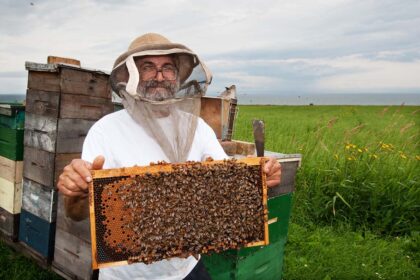
Beekeeping is an ancient practice that has grown in popularity in recent years, especially in the US. In addition to producing delicious honey, bees play an important role in pollinating plants and maintaining environmental balance – bees are indeed life sustaining.
In this blog post, we’ll explore the fascinating world of bees in America and highlight their benefits to humans and the environment. We will explore the history of beekeeping, the importance of honey bees, the development of beekeeping in the United States, and steps to start your own apiary.
A brief history of beekeeping:
Beekeeping dates back thousands of years and is practiced by civilizations around the world. The ancient Egyptians, Greeks and Romans prized bees and their honey. European settlers brought honey bees to the New World, where they thrived in a variety of North American ecosystems. But it wasn’t until the mid-1800s that beekeeping became a commercial enterprise in the United States.
The Importance of Honeybees :
Honeybees are vital pollinators, playing a key role in the reproduction of flowering plants. Approximately one-third of the world’s food supply depends on pollinators, with bees being the most important contributors. They transfer pollen from the male parts (anthers) to the female parts (stigma) of flowers, allowing fertilization and subsequent fruit and seed production. Without bees, our food system would suffer immensely, leading to reduced crop y
Development of beekeeping in the United States:
In recent years, beekeeping has grown in popularity throughout the United States. This increase can be attributed to a number of factors, including increased awareness of the importance of factors to pollinators, the rise of organic agriculture, and a willingness to develop practices that will go away so sustainable Urban beekeeping has also flourished, with rooftop apiaries and community gardens providing ideal habitats for colonies and limited biodiversity.
Benefits of Beekeeping:
Beekeeping offers a wide array of benefits, both for individuals and the environment. Here are a few key advantages:
a) Honey Production: Beekeepers can enjoy the sweet reward of their labor by harvesting honey. Raw, local honey is prized for its unique flavors and potential health benefits.
b) Pollination: By keeping bees, individuals contribute to the overall health and productivity of surrounding ecosystems. Increased pollination leads to better crop yields, improved biodiversity, and a healthier environment.
c) Environmental Stewardship: Beekeeping aligns with sustainable practices by promoting biodiversity and supporting healthy ecosystems. Bees play a critical role in preserving plant species and promoting overall ecological balance.
d) Educational Opportunities: Beekeeping provides an excellent opportunity for education and awareness. By sharing the joys and challenges of beekeeping, individuals can foster a deeper understanding and appreciation for these remarkable insects.
In conclusion, beekeeping in the United States is not just a sweet endeavor for honey production but a vital practice for the sustainability of our environment. Bees, with their remarkable pollination capabilities, ensure the reproduction of flowering plants, making them essential for food production and ecosystem health.
The history of beekeeping dates back centuries, and its growth in recent years reflects a growing recognition of its importance. Beekeeping offers numerous benefits, including honey production, improved pollination, environmental stewardship, and educational opportunities.
As we continue to face environmental challenges and the decline of pollinators, beekeeping serves as a beacon of hope, demonstrating how individuals can contribute to the well-being of our planet.
By embracing the captivating world of bees, we can not only savor the fruits of their labor but also cultivate a deeper appreciation for the delicate balance of nature and our interconnectedness with it.
So, let’s celebrate the buzzing wonders of beekeeping and continue to support the thriving beekeeping community across the United States.



